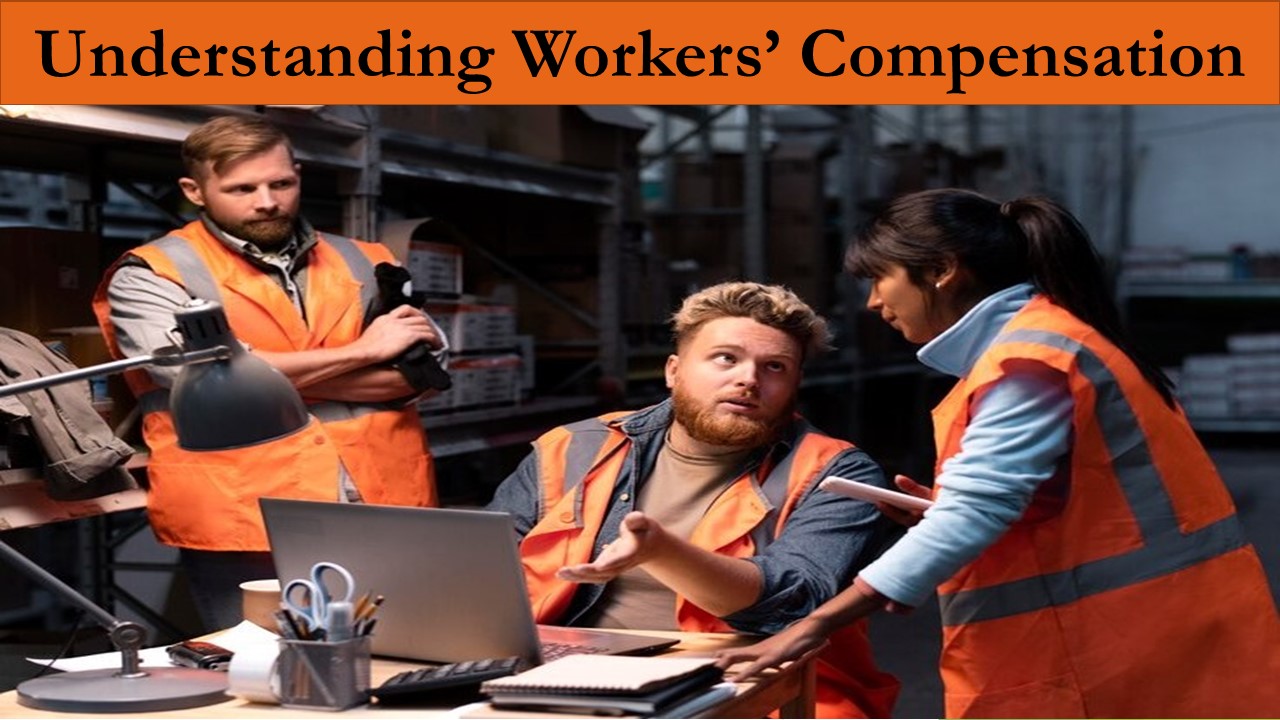Understanding Workers’ Compensation - PowerPoint PPT Presentation
Title:
Understanding Workers’ Compensation
Description:
Workers’ Compensation, often referred to as workers' comp, is a legally required program that offers benefits to workers who suffer injuries or illnesses as a result of their job. – PowerPoint PPT presentation
Number of Views:10
Title: Understanding Workers’ Compensation
1
Understanding Workers Compensation
2
- ?
- Workers' Compensation is a critical safety net
for employees who get injured or ill on the job.
This comprehensive guide will help you understand
its ins and outs. - What is WorkersCompensation?
- Workers Compensation, often referred to as
workers' comp, is a legally required program that
offers benefits to workers who suffer injuries or
illnesses as a result of their job. It's
essentially a disability insurance program for
workers, providing financial and healthcare
benefits. - How WorkersCompensation Works in the United
States - In the U.S., each state primarily handles
workers compensation, and the required benefits
can vary significantly. Only Texas does not
mandate employers to maintain workers
compensation insurance.
3
- ?
- Core Benefits of Workers Compensation
- By accepting workers compensation benefits,
employees waive their right to sue their employer
for damages. The compensation may include partial
salary reimbursement and coverage of medical
costs. However, it's essential to note that
workers' comp differs from unemployment benefits
or disability insurance. - Understanding the Specifics of Workers
Compensation - Workers compensation benefits may include
partial wage replacement during the period the
employee cannot work. They may also cover
healthcare services and occupational therapy. - Most workers compensation programs are funded by
private insurers, from premiums paid by
individual employers. Each state has a Workers
Compensation Board that oversees the program and
steps in during disputes.
4
- ?
- Federal Workers Compensation Programs
- There are federal workers compensation programs
for federal employees, longshore and harbor
workers, and energy employees. Another federal
program, the Black Lung Program, handles death
and disability benefits for coal miners and their
dependents. - Workers Compensation Benefits Requirements
- Requirements for workers compensation vary from
state to state. Some states exclude small
businesses from the mandate for coverage, while
others have different requirements for various
industries. The National Federation of
Independent Business (NFIB) maintains a summary
of each states worker compensation requirements.
5
- ?
- Salary Replacement and Healthcare Cost
Reimbursement - The salary replacement paid to an employee under
workers compensation is typically less than the
persons full salary. The most generous programs
pay about two-thirds of the persons gross
salary. - Most compensation plans offer coverage of medical
expenses only related to injuries incurred as a
direct result of employment. If an employee dies
as a result of a work-related incident, workers
compensation makes payments to the workers
dependents. - Special Considerations and Disputes
- A claim for workers compensation may be disputed
by an employer. In that case, the Workers
Compensation Board may be asked to resolve the
dispute. Disputes can arise over whether the
employer is actually liable for an injury or
illness. Workers compensation payments are also
susceptible to insurance fraud.
6
- ?
- Independent Contractor Exception
- In most states, only regular employees are
eligible for workers compensation independent
contractors are not. This was a significant point
of debate over a California ballot measure that
sought to extend employee benefits to drivers for
ride-sharing apps like Uber and Lyft. - Types of Workers Compensation
- In the U.S., workers compensation rules are
handled by the individual states. The lack of
federal standards for workers compensation has
resulted in extremely varied policies for the
same kinds of injuries from state to state. - Workers Compensation Coverage A vs. Coverage B
- There are two types of workers compensation
coverage Coverage A and Coverage B. Coverage A
includes all of the state-mandated benefits that
an injured or ill employee is entitled to receive
from the employers insurance.
7
- ?
- Coverage B pays benefits that exceed the minimums
required by Coverage A. They usually are paid
only as the result of a successful lawsuit
brought by the employee for negligence or other
misconduct by the employer. - The Bottom Line
- Every state (except Texas) requires employers to
provide workers compensation coverage to at
least some of their employees. The states write
the rules, so there are many exceptions and
exemptions. Contractors and freelancers are
rarely covered, and many states exclude certain
professions from the mandate or otherwise limit
the scope of the benefits. - Note This guide provides a general overview of
workers' compensation it does not offer legal
advice. The rules and regulations surrounding
workers' compensation can vary greatly from state
to state, so it's essential to consult with a
legal professional or your state's Workers'
Compensation Board for advice tailored to your
specific situation.































